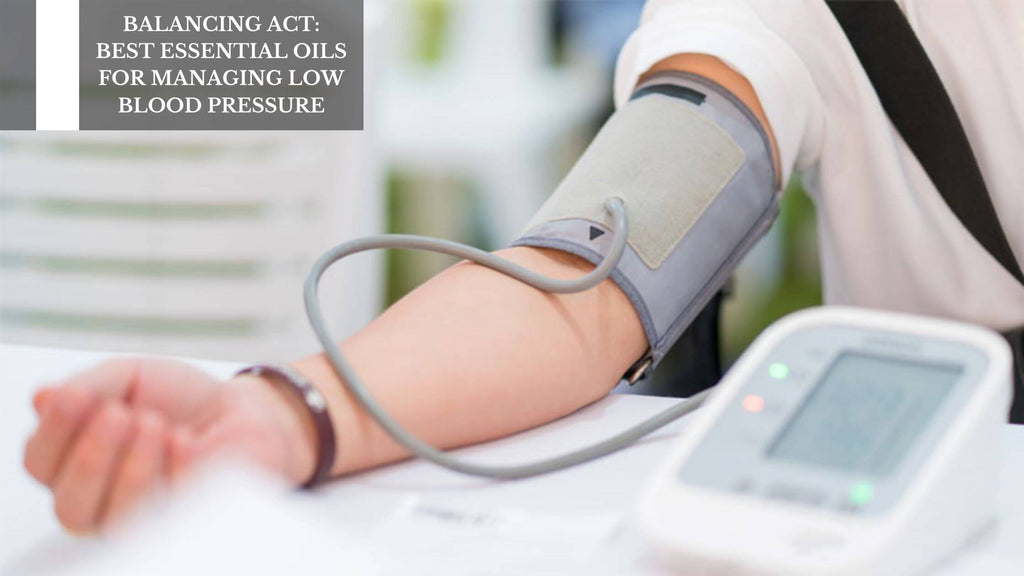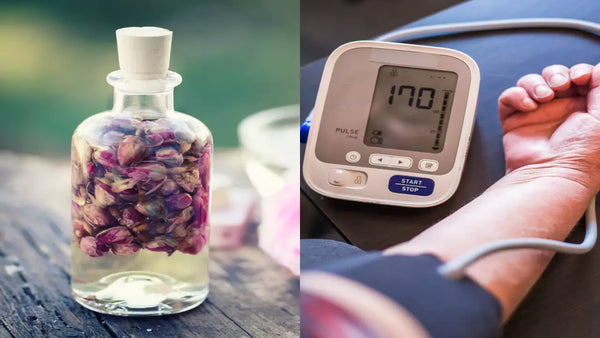Balancing Act: Best Essential Oils For Managing Low Blood Pressure

High blood pressure, or hypertension, is a common condition affecting millions of people worldwide. It can often go undetected for years, leading to serious health problems such as heart disease and stroke. If you are looking for a natural way to manage your blood pressure, essential oils may be just the solution you need. Essential oils are derived from plants and can help reduce stress, lower blood pressure, and improve overall health. High blood pressure, also known as hypertension, is a common health concern affecting millions of people worldwide. While medication is often prescribed to manage blood pressure levels, many individuals are turning to natural remedies as a holistic approach to support their cardiovascular health. Essential oils have gained popularity for their therapeutic properties and potential benefits in promoting overall well-being.
You may also like:
Derived from plants, essential oils contain aromatic compounds that can have a positive impact on various aspects of health, including blood pressure regulation. When it comes to blood pressure management, essential oils can be a valuable tool in maintaining a healthy balance. Certain essential oils, such as lavender, frankincense, and ylang-ylang, have calming and soothing properties that can help lower stress levels and promote a sense of peace and relaxation. Others, like peppermint and lemon, have invigorating properties that can help boost energy and improve circulation. By understanding the benefits of essential oils for blood pressure management, you can incorporate them into your daily routine to support your overall health and well-being. Whether used in aromatherapy, massage, or diffused in the air, these natural remedies offer a gentle and effective way to help balance your blood pressure and promote a healthier lifestyle.
Best essential oils for low blood pressure
1. Ylang-ylang essential oil
This essential oil is a powerful natural remedy that promotes relaxation, reduces stress, and helps balance emotions, all of which are vital components in managing blood pressure. The sweet, floral aroma of ylang-ylang essential oil has a direct impact on the nervous system, helping to alleviate feelings of anxiety and tension. By inhaling the aroma or applying the oil topically, individuals can experience a sense of tranquillity and calmness, which in turn can lead to a decrease in blood pressure. Ylang-ylang essential oil is also known to have a positive effect on heart health by reducing heart rate and promoting better circulation. Its ability to relax both the body and mind makes it an excellent choice for those seeking natural ways to support their cardiovascular health. Incorporating ylang-ylang essential oil into your daily routine, whether through diffusing, massage, or aromatherapy, can be a holistic approach to managing blood pressure levels and promoting overall well-being.
2. Frankincense essential oil
When it comes to balancing blood pressure naturally, frankincense essential oil is a powerful ally. This ancient oil is known for its ability to support overall cardiovascular health and promote healthy blood circulation. By incorporating frankincense essential oil into your daily routine, you can help maintain healthy blood pressure levels and support your heart health. The anti-inflammatory properties of frankincense essential oil can also assist in reducing inflammation in blood vessels, which is beneficial for cardiovascular function. In addition to its cardiovascular benefits, frankincense essential oil has a calming and grounding aroma that can help reduce stress and promote relaxation. Stress is a common factor that can contribute to high blood pressure, so incorporating frankincense essential oil into your wellness routine can help address both the physical and emotional aspects of blood pressure management.
3. Rosemary essential oil
Its ability to improve blood flow and reduce inflammation makes it a valuable addition to any essential oil collection. The scent of rosemary essential oil is invigorating and uplifting, making it a popular choice for aromatherapy practices aimed at promoting overall well-being. The active compounds in rosemary essential oil have been shown to have vasodilatory effects, meaning they help to relax and dilate blood vessels, leading to improved circulation. This can help to lower blood pressure and reduce the risk of cardiovascular issues. Additionally, rosemary essential oil's anti-inflammatory properties can help to reduce swelling and discomfort in the body, promoting better overall health. To incorporate rosemary essential oil into your routine for blood pressure management, you can add a few drops to a diffuser and breathe in the aromatic vapor, dilute it with a carrier oil for a relaxing massage, or even add a drop to your bath for a soothing soak. With its pleasant aroma and potent benefits, rosemary essential oil is a must-have for those looking to support their cardiovascular health naturally.
4. Clary sage essential oil

Hormonal imbalances can have a significant impact on blood pressure levels, especially in women. Clary sage essential oil contains natural phytoestrogens that can help regulate hormone levels, promoting overall balance in the body. By supporting hormonal equilibrium, clary sage essential oil can contribute to a healthier cardiovascular system and help maintain optimal blood pressure. Furthermore, stress is a common contributor to high blood pressure. Chronic stress can lead to elevated cortisol levels, which in turn can raise blood pressure. Clary sage essential oil is renowned for its calming and soothing properties, making it an excellent choice for reducing stress and promoting relaxation. By alleviating stress and promoting a sense of calm, clary sage essential oil can help lower blood pressure and support overall cardiovascular health. Incorporating clary sage essential oil into your wellness routine, whether through aromatherapy, massage, or diluted topical application, can be a natural and effective way to support hormonal balance, reduce stress, and ultimately help control blood pressure holistically.
You may also like:
FAQs
1) How to use essential oils for managing low blood pressure?
When applying essential oils topically, target pulse points like the wrists, temples, and neck. Gently massage the diluted oil into the skin for better absorption. Be cautious when applying essential oils near sensitive areas such as the eyes, mucous membranes, or broken skin. Before using any essential oil on a larger area of the skin, perform a patch test by applying a small amount to a small area and waiting for any adverse reactions for 24 hours.
2) What are the benefits of using essential oils for managing low pressure?
By combining the power of essential oils with other holistic practices such as a balanced diet, regular exercise, stress management techniques, and adequate sleep, you can create a comprehensive approach to blood pressure management. Essential oils like lavender, peppermint, and frankincense have calming and soothing effects that can help reduce stress and promote relaxation, which in turn may positively impact blood pressure levels. It's important to remember that essential oils are not a substitute for medical treatment or prescribed medications.


Leave a comment